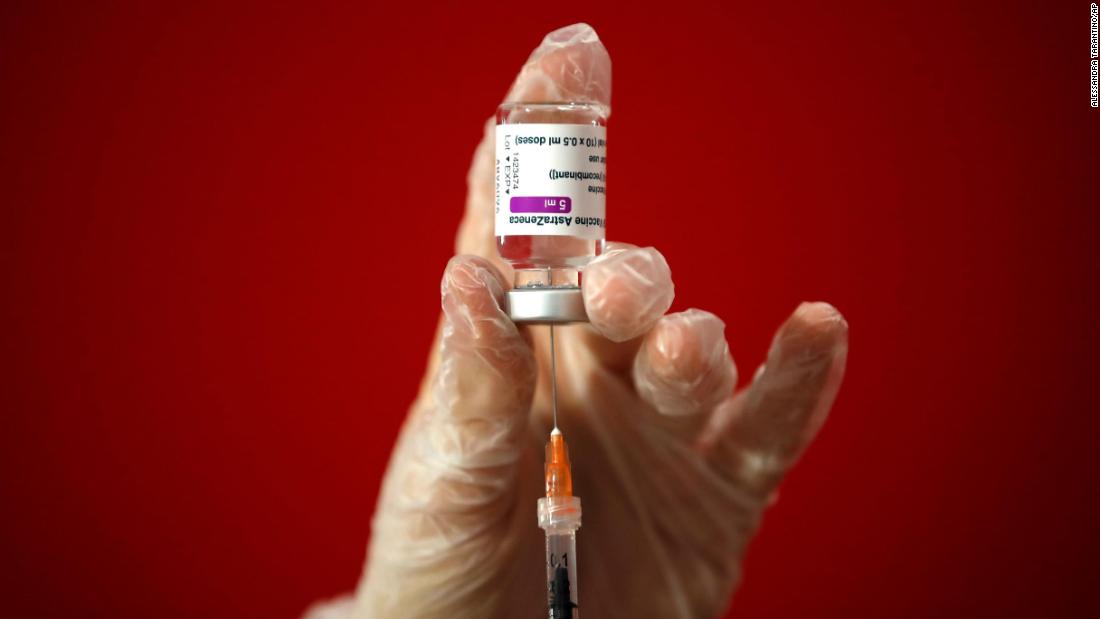Intense discussions are taking place after a request for doses from the two countries and, at least for Mexico, an agreement may be announced as early as Friday, according to the Mexican chancellor.
“I would say that we have made good progress, but the details, numbers, provisions, will not be known until Friday,” Mexican Chancellor Marcelo Ebrard told reporters on Tuesday morning, according to Reuters. “We request as much as possible (doses of AstraZeneca).”
On Wednesday, White House press secretary Jen Psaki confirmed that requests had been received from both Mexico and Canada and said they were being considered carefully. She did not provide details on when a decision would be reached.
The government official told CNN that one option under consideration is an exchange agreement with the two countries: an agreement to share doses of AstraZeneca now with the proviso that Mexico and Canada share excess vaccines with the US in the future.
There are tens of millions of doses of AstraZeneca stored in the U.S. and the company believes it will have about 50 million doses of the Covid-19 vaccine available to the U.S. government by the end of April. None of these doses are available to Americans now because AstraZeneca has not applied to the Food and Drug Administration for emergency use authorization, and the vaccine is still undergoing clinical trials in the United States.
AstraZeneca has been approved for use in Canada and Mexico, and the company itself has asked the Biden government to consider requests to donate inventory to other nations.
Mexican President Andrés Manuel Lopez Obrador announced Monday that he was close to reaching two vaccine agreements, but did not specify which countries would send them. Another high-ranking official in Mexico publicly asked the United States to share AstraZeneca vaccines earlier this week.
A Canadian embassy spokesman said there were “big commitments” to the Biden administration about Covid-19 and added that “talks are underway” when it comes to vaccinating more Canadians. The spokesman did not comment on the possible exchange agreement.
Tensions over vaccine diplomacy
These talks take place at a time when political leaders in Mexico and Canada are under increasing pressure to secure vaccines amid a broader global dose race.
The United States is now ahead of almost every other country in the world when it comes to vaccinating its population and contracts signed with vaccine producers. Biden said last week that by May 1, all adults will be able to receive the vaccines.
The US contributed $ 2 billion in total to a global coronavirus vaccine initiative called COVAX, and pledged to release an additional $ 2 billion “as we work with other donors to raise commitments”. It has established bilateral agreements with certain countries for vaccine storage efforts and is working alongside allies in the Asia-Pacific region to increase production in India.
The Biden administration will end up sharing excess vaccines – in addition to AstraZeneca doses – and does not see joint efforts alongside U.S. allies as preventing them from donating vaccines unilaterally to other countries in the future, according to the senior administration official.
“We are donating US $ 4 billion to COVAX. But we also know that when we vaccinate our own country, since we suffer worse than almost any other country besides Brazil – we are both there with more than 530,000 deaths – then we will make any surplus vaccine available to countries that do not have the resources to be able to do it themselves, “said Dr. Anthony Fauci, director of the National Institute of Allergy and Infectious Diseases, at a hearing by the Chamber’s Energy and Commerce Committee on Wednesday.
Biden made the same commitment last week.
“If we have a surplus, we will share it with the rest of the world,” said Biden. “Let’s start by making sure that Americans are served first.”
Secretary of State Antony Blinken also said last week that “until everyone in the world is vaccinated, nobody will be really safe”.
The Biden government’s decision to focus internally on vaccines, especially given the extreme global need and the government’s top priority to reaffirm the US’s global leadership, is putting the Biden government in a somewhat awkward position compared to its global rivals.
China has taken a different approach than the U.S. and is exporting vaccines widely before making them widely available at home. Russia and India are also sharing vaccines, but not on the same scale as Beijing. China’s Ministry of Foreign Affairs announced on March 3 that it is providing free vaccines to 69 countries and exporting them commercially to 28 others.
Some US allies and partners are concerned that China’s global effort to increase vaccine exports and vaccine production agreements so quickly will make it difficult for the United States to reach them, diplomats told CNN.
Mexico has received injections of AstraZeneca from India and is also the focus of China’s vaccine diplomacy. Mexican media reported on March 9 that the country will receive 22 million doses of China’s Sinovac and Sinopharm vaccines.
Beijing’s pressure to export vaccines aggressively was characterized by US officials as an attempt to spread China’s influence and soft power.
When asked on Wednesday whether the United States will be able to overcome China’s vaccine diplomacy efforts after fulfilling its commitment to vaccinate Americans, State Department deputy spokeswoman Jalina Porter did not answer the question.
A State Department spokesman said that while Biden made clear the priority of vaccinating Americans, he is also “deeply focused on the issue of expanding global vaccination, manufacturing and distribution, which will be critical to ending the pandemic” .
CNN’s Nicole Gaouette and Jennifer Hansler contributed to this report.
